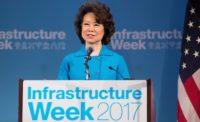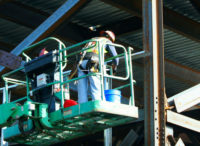Chao Hearing Gives a Peek at Trump Infrastructure Plan

Fixing the Fund Chao says working on a solution to the Highway Trust Fund’s revenue shortfall will be among Trump’s top priorities. Photo courtesy of Senate Commerce, Science and Transportation Committee
Construction industry officials hungering for details about President-elect Donald Trump’s $1-trillion infrastructure proposal have gleaned some hints about the plan from Elaine Chao, Trump’s nominee to lead the Dept. of Transportation.
At Chao’s Jan. 11 Senate confirmation hearing, members of the Commerce, Science and Transportation Committee tried to elicit details of the plan from Chao, with little success. She did outline some broad features about the still- undeveloped proposal, saying private-sector financing will be a key element and that it will include direct federal funding, too. Chao also said that addressing the Highway Trust Fund’s persistent revenue shortfall will be high on Trump’s list as he begins his term in office.
She noted that the Trump team will be assembling an infrastructure task force to put together the plan, an indication that the proposal’s shape is far from settled and that it won’t be released soon.
An open question is which part of the administration will be in charge of developing the infrastructure plan. An industry source says, “I certainly hope that U.S. DOT and the secretary have an opportunity to play a really strong role and a leadership role, but I think that is a little bit unclear at this point.”
One thing that looks certain is Chao’s confirmation, judging from the warm reception committee members gave her. The panel’s chairman, John Thune (R-S.D.), said, “I would say that, if you were to imagine an ideal candidate to tackle these challenge [facing DOT], it would be hard to come up with a more qualified nominee than the one before us.”
Also enhancing Chao’s confirmation chances is that her husband is Majority Leader Mitch McConnell (R-Ky.), who introduced her at the hearing. # In her testimony, Chao discussed the infrastructure plan in general terms. She noted that one “major challenge is to unleash the potential for private investment in our nation’s infrastructure.”
She added, “In order to take full advantage of the estimated trillions [of dollars] in capital that equity firms, pension funds and endowments can invest, these partnerships must be incentivized with a bold new vision.”
Chao also indicated that the program would have “a mix of practical solutions—both public and private—that provide the greatest cost-benefit to the public.”
Newly elected Sen. Todd Young (R-Ind.) asked about public-private ventures. Chao said, “There are times when public-private partnerships have not been welcomed. And so, at the very minimum, we need to do away with some of these impediments.” She added, “And private investment is encouraged to enter when they see a bold vision, and this president has a bold vision. We will be talking about it when the administration comes into being after January 20th.”
During the presidential race, the Trump campaign released a document that discussed attracting private infrastructure investment through tax credits totaling $137 billion. Referring to that proposal, Sen. Cory Booker (D-N.J.) asked Chao whether the Trump administration also would support direct federal infrastructure spending as part of the plan. She said, “I believe the answer is yes.”
Highway funding was a major topic of discussion. Sen. Deb Fischer (R-Neb.) noted the Highway Trust Fund’s revenue woes, saying it faces a projected $107- billion, five-year shortfall after the Fixing America’s Surface Transportation (FAST) Act lapses in 2020.
Chao agreed that the fund “is in bad shape,” saying that its annual revenue is $10 billion short of spending. “This is a huge issue,” she said. For now, transfers from the general fund are keeping the program out of the red.
Chao didn’t offer a trust-fund rescue plan. She said, “The pay-fors for any infrastructure proposal are all challenging, and all have their particular champions and also detractors.” Working on a trust-fund solution will be “among the top priorities” for the new president, she said.
Brian Deery, senior director of the Associated General Contractors of America’s highway and transportation division, says Chao’s trust-fund comments are encouraging. Private financing can help some projects, such as those generating revenue, through tolls or other means, he says. But Deery adds, “The Highway Trust Fund generally supports the entire program, the entire system. It spreads its benefits in a much better way.”
Colorado and Nevada senators noted current highway-aid distribution formulas use outdated population numbers, shortchanging their fast-growing states. But Congress left the formulas unchanged in the 2015 FAST Act, which won’t expire for three years. Chao said, “If the Congress wishes to change the formula, that is obviously a conversation the administration would have with the Congress.”




